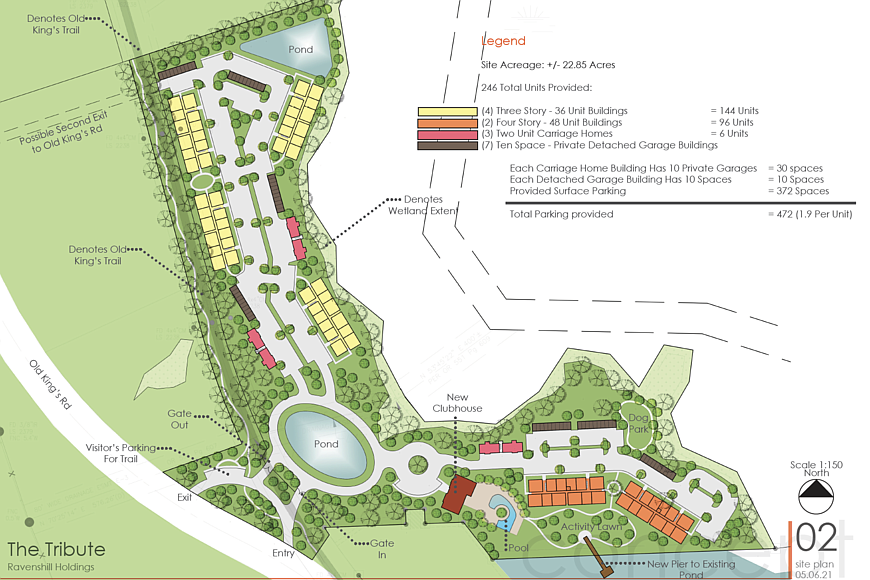- January 17, 2025
-
-
Loading

Loading

A vacant plot of land on Old Kings Road may become a 246-unit apartment complex.
The Palm Coast City Council approved a rezoning necessary for the proposed complex in a 3-2 vote on Sept. 7, with council members Eddie Branquinho and Victor Barbosa dissenting.
"They’re coming, no doubt about it. But we have the power to say how fast."
— EDDIE BRANQUINHO, city councilman
The council had been divided 2-2 on the proposed complex at a previous meeting while Councilman Ed Danko was absent, quarantining due to COVID-19 exposure. Danko was back on Sept. 7 and cast the tie-breaking vote in favor of the development.
The proposed complex would consist of “higher-end apartments” on a 22-acre parcel on the eastern side of Old Kings Road about a third of a mile north of State Road 100, and the council’s decision Sept. 7 allows one portion of the property to be rezoned from a current commercial designation to a multifamily residential designation.
Of the 246 homes, 240 will be apartment units in three- or four-story buildings, while the remaining six will be “carriage homes” similar to townhouses.
Project manager Charlie Faulkner, in a presentation to the City Council, said the location is perfect for a multifamily development.
“The location, very simply, is the very best location in the entire county,” he said.
He said that there would be transportation opportunities in every direction for the development’s residents, and that neighboring properties are zoned commercial. The new residential development, he said, will provide potential customers for those commercial developments.
“This project will actually raise the value and the marketability of that commercial property surrounding it,” he said.
The development’s opponents on the council, Barbosa and Branquinho, hadn’t challenged the development’s quality or noted any reasons that it would be at odds with the city’s Comprehensive Plan or Future Land Use Map.
Instead, they’d objected broadly to the rezoning of commercial property as residential property: Barbosa said the city’s tax base is already weighted too heavily toward residents and that the city needs more businesses to even it out, while Branquinho expressed concern that the city is becoming overdeveloped.
“My problems is [the] density, that’s the only problem I have,” Branquinho said.
But City Attorney Bill Reischmann warned the council that, under the law, it could deny the proposed rezoning only narrow legalistic grounds: It would have to be able to show that the proposal was at odds with the city’s codes.
City Councilman Nick Klufas noted that the developer, at the Sept. 7 meeting, had brought a court stenographer who was busily recording the council’s discussion.
Klufas added that the developer already has a successful development in Palm Coast — the nearby Tuscan Reserve. When residents complain about development, he said, they’re generally saying they don’t want it in their backyard.
“This is not in anybody’s backyard,” Klufas said. “It’s just not going to impact too many people.”
Several residents, during the meeting’s public comment period, said they opposed the development, saying they thought that more residential development would overtax the city’s infrastructure or schools.
Developers pay impact fees to offset those impacts.
One resident, the real estate writer Toby Tobin, said the city needs more multifamily housing.
“We’re at full capacity in every different housing market. ... Nothing is available,” he said.
He noted that ITT’s original vision for Palm Coast suggested a housing stock that would be almost half multifamily. The current housing stock is about 9% multifamily.
“We are way out of balance with the original ITT plan,” he said. “I support this project wholeheartedly.”
Branquinho agreed with Tobin that people are trying to move to Palm Coast.
“They’re coming, no doubt about it,” he said. “But we have the power to say how fast. ... I’m in absolutely no rush to let it grow that fast. I love the way Palm Coast was; I still love it.”
Mayor David Alfin reminded the council that, in accordance with a new state law, the city had just, at that very meeting, incorporated into its Land Development Code a statement supporting property rights.
After the 3-2 vote, Branquinho proposed a six-month moratorium on residential development, suggesting the council take that time to discuss what the city’s future should look like.
Other council members didn’t express support for a moratorium, but Mayor David Alfin said he’d be willing to review the city’s Future Land Use Map.